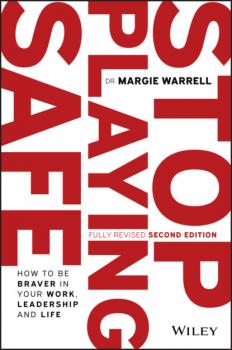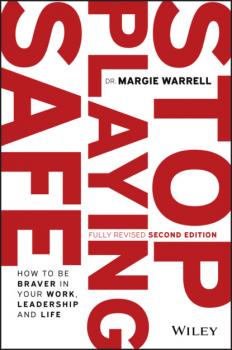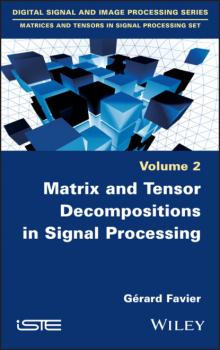John Wiley & Sons Limited
Все книги издательства John Wiley & Sons LimitedStop Playing Safe
Have you ever looked back and wished you’d been braver? Today’s culture of fear is constantly bombarding you with reasons to play it safe. Yet, is it keeping you living too safely, procrastinating and not taking the very actions that would help you enjoy greater self-confidence, professional success and personal fulfillment. If you ever hold back from making changes or taking chances, Stop Playing Safe is for you. In this fully updated 'post-pandemic' edition, Dr Margie Warrell challenges you to 'rethink risk' and back your boldest goals with braver action. Drawing on her diverse global experience working in coaching, psychology and with trailblazing leaders such as Richard Branson and Bill Marriott, this book will empower you to master fear and 'take the chance' when it matters most. Margie will get to the heart of what’s holding you back, giving you proven strategies to: find your 'Why' to do more of what ignites your passion (and less of what doesn't!) uncover your blind spots to make smarter decisions, faster apply four simple steps to build resilience and manage your 'stress triggers' activate 'post traumatic growth' to turn your toughest problems into your greatest growth nail difficult conversations to resolve conflict, build trust, and strengthen relationships be an inspiring leader who emboldens others to think bigger, learn faster, and accomplish more. Whether you’re a business owner, climbing the corporate ladder or embarking on an entrepreneurial endeavor, Stop Playing Safe is powerful reading for anyone who doesn’t want to settle for less than the biggest life they’re capable of living.
Simulation and Analysis of Mathematical Methods in Real-Time Engineering Applications
Written and edited by a group of renowned specialists in the field, this outstanding new volume addresses primary computational techniques for developing new technologies in soft computing. It also highlights the security, privacy, artificial intelligence, and practical approaches needed by engineers and scientists in all fields of science and technology. It highlights the current research, which is intended to advance not only mathematics but all areas of science, research, and development, and where these disciplines intersect. As the book is focused on emerging concepts in machine learning and artificial intelligence algorithmic approaches and soft computing techniques, it is an invaluable tool for researchers, academicians, data scientists, and technology developers. The newest and most comprehensive volume in the area of mathematical methods for use in real-time engineering, this groundbreaking new work is a must-have for any engineer or scientist’s library. Also useful as a textbook for the student, it is a valuable contribution to the advancement of the science, both a working handbook for the new hire or student, and a reference for the veteran engineer.
In AI We Trust
One of the most persistent concerns about the future is whether it will be dominated by the predictive algorithms of AI – and, if so, what this will mean for our behaviour, for our institutions and for what it means to be human. AI changes our experience of time and the future and challenges our identities, yet we are blinded by its efficiency and fail to understand how it affects us. At the heart of our trust in AI lies a paradox: we leverage AI to increase our control over the future and uncertainty, while at the same time the performativity of AI, the power it has to make us act in the ways it predicts, reduces our agency over the future. This happens when we forget that that we humans have created the digital technologies to which we attribute agency. These developments also challenge the narrative of progress, which played such a central role in modernity and is based on the hubris of total control. We are now moving into an era where this control is limited as AI monitors our actions, posing the threat of surveillance, but also offering the opportunity to reappropriate control and transform it into care. As we try to adjust to a world in which algorithms, robots and avatars play an ever-increasing role, we need to understand better the limitations of AI and how their predictions affect our agency, while at the same time having the courage to embrace the uncertainty of the future.









